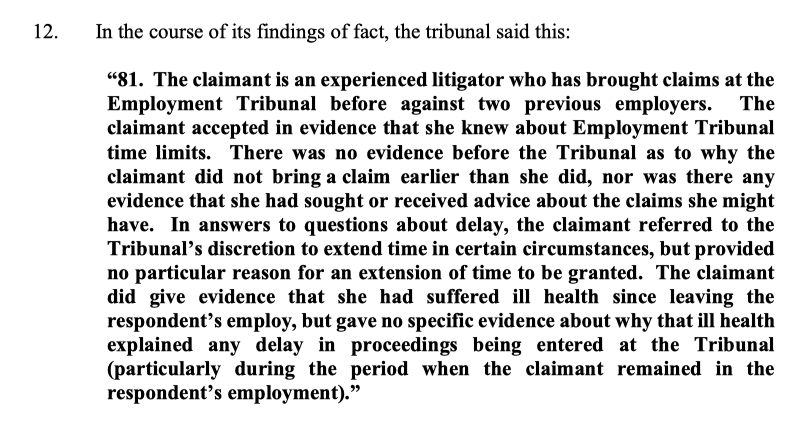
1/ Phipps v Priory Education: EAT reviews the law on reconsideration where the losing party's legal rep was at fault, & finds no brightline between how to treat the party whose rep was incompetent as against one whose rep committed misconduct.
assets.publishing.service.gov.uk/media/632de506…
#ukemplaw
assets.publishing.service.gov.uk/media/632de506…
#ukemplaw
2/ Mrs P brought unfair dismissal, age & disability discrim claims revolving around a dismissal for failure to complete a qualification which was said to be mandatory for her to continue to work in a vulnerable children's home.
3/ Mrs P's legal rep applied for an adjournment shortly before trial on the basis that he'd suffered a medical emergency resulting from a brain infection. The adjournment was granted but the EJ ordered the rep to provide medical evidence re his condition & unfitness to attend.
4/ He provided insufficient medical evidence & then failed to comply with further orders to provide it. Ultimately a strike out warning was issued for failure to comply with the ET order & for it appearing the claim wasn't being actively pursued.
5/ Mrs P & her rep didn't respond to that warning, nor to the invitation to request a hearing on the matter. The working day before the adjourned trial, the ET struck out Mrs P's claims on grounds of non-compliance and not actively pursuing the claim. 

6/ The R applied for costs/wasted costs & Mrs P applied for reconsideration of the strike out (having obtained new legal reps by this point). Her grounds focused on being completely unaware of all the shenanigans & failures of her previous rep & of the orders made. 

7/ Whilst the ET accepted she'd been deceived by her 1st rep, it maintained the strike out decision (& ordered wasted costs against the rep). The ET found that rep had misled them into adjourning the 1st trial dates & spoke of the inconvenience to the R.
8/ Mrs P appealed the refusal of reconsideration, asserting that the ET had improperly considered itself bound to find that the fault of a legal rep can't excuse a party from non-compliance with ET orders. 

9/ The EAT disagreed with that characterisation of the ET judgment. The ET correctly cited Lindsay v Ironsides as authority that failings of a party's representative won't "generally" found grounds for review rather than not being capable of doing so. 

10/ Mrs P sought to draw a distinction in the case law between cases of incompetence by legal reps & cases of positive misconduct, suggesting that the latter falls outside the restrictive approach of Lindsay. Mrs P relied on Newcastle v Marsden to make this submission. 



11/ The EAT disagreed. It considered that Marsden didn't lay down any rule but merely respected the EJ's decision in that case (to allow the reconsideration where counsel told M there was no need to attend a hearing & misled the ET on that) as being a permissible decision. 

12/ Ultimately the ET in Mrs P's case hadn't approached Lindsay as a blanket rule, had properly considered the facts & had reached a reasonable conclusion. Whilst Mrs P wasn't at fault personally, the conduct of her claim wasted a lot of ET & respondent time. 

13/ Rule 70 confers a broad discretion, which takes account not only of the interests of the party applying for reconsideration, but also the other party & the ET, & it's a rule which has at its heart an interest in the finality of litigation. The decision here was appropriate. 



14/ @42BR_Employment roommate @RadBarrister for the Appellant, instructed by Atkinson Rose. Not quite able to persuade the EAT on this occasion, but the quality of his submissions was rightly recognised by Griffiths J: 

• • •
Missing some Tweet in this thread? You can try to
force a refresh










